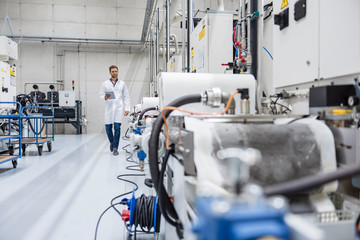The manufacturing industry, a cornerstone of global economies, has always been at the forefront of technological advancement. From the steam engine to assembly lines, each leap in innovation has brought about a surge in productivity, efficiency, and economic growth. Today, we stand on the brink of another transformative era—one driven by artificial intelligence (AI). The integration of AI in the manufacturing industry is reshaping how products are designed, produced, and delivered, leading to unprecedented levels of precision, speed, and adaptability.
The Evolution of AI in Manufacturing
Artificial intelligence, once a concept confined to the realm of science fiction, has become a tangible force driving change across various industries. In manufacturing, AI’s journey began with simple automation and robotics, which gradually evolved into more sophisticated systems capable of learning, adapting, and making decisions. Early applications of AI in manufacturing were primarily focused on automating repetitive tasks, but as the technology advanced, its role expanded to include complex problem-solving, predictive analytics, and even quality control.
Enhancing Efficiency and Productivity
One of the most significant impacts of AI in the manufacturing industry is its ability to enhance efficiency and productivity. Traditional manufacturing processes often involve manual interventions, which can lead to inefficiencies, errors, and delays. AI-powered systems, however, can operate continuously without fatigue, performing tasks with greater accuracy and consistency. For example, AI-driven machines can optimize production schedules, predict maintenance needs, and reduce downtime by identifying potential issues before they cause disruptions.
Moreover, AI can analyze vast amounts of data generated during the manufacturing process to identify patterns and trends that would be impossible for humans to detect. This data-driven approach allows manufacturers to fine-tune their operations, reducing waste, minimizing energy consumption, and improving overall resource utilization. The result is a leaner, more agile manufacturing process that can adapt to changing market demands with ease.
Predictive Maintenance: A Game Changer
One of the standout applications of AI in manufacturing is predictive maintenance. Traditional maintenance practices often rely on fixed schedules or reactive responses to equipment failures, leading to either unnecessary downtime or costly repairs. Predictive maintenance, powered by AI, changes this paradigm by continuously monitoring equipment performance in real-time.
Using sensors and data analytics, AI can predict when a machine is likely to fail and alert operators before any disruption occurs. This proactive approach not only prevents unexpected breakdowns but also extends the lifespan of machinery, reduces maintenance costs, and ensures uninterrupted production. By optimizing maintenance schedules, manufacturers can achieve significant cost savings and improve overall operational efficiency.
Quality Control and Defect Detection
Maintaining high-quality standards is crucial in manufacturing, as even minor defects can lead to costly recalls, reputational damage, and lost revenue. Traditionally, quality control has been a labor-intensive process, requiring skilled inspectors to manually examine products for defects. However, this approach is prone to human error and can be time-consuming, especially in high-volume production environments.
AI has revolutionized quality control by enabling automated defect detection. Machine learning algorithms can be trained to recognize patterns associated with defects, allowing AI-powered systems to inspect products with unmatched speed and accuracy. These systems can identify defects that may be invisible to the human eye, ensuring that only products meeting the highest standards reach the market.
Furthermore, AI-driven quality control systems can provide real-time feedback, allowing manufacturers to address issues immediately and prevent defective products from entering the supply chain. This level of precision not only reduces waste but also enhances customer satisfaction and trust in the brand.
Supply Chain Optimization
In today’s globalized economy, supply chains are more complex and interconnected than ever before. Managing these intricate networks requires a level of coordination and visibility that traditional methods struggle to achieve. AI offers a solution by providing manufacturers with the tools to optimize their supply chains from end to end.
AI can analyze vast amounts of data from suppliers, logistics providers, and customers to predict demand fluctuations, identify potential bottlenecks, and optimize inventory levels. This predictive capability allows manufacturers to respond more effectively to market changes, reducing the risk of stockouts or overproduction.
Additionally, AI can enhance supply chain transparency by tracking the movement of goods in real-time and identifying any disruptions. This visibility enables manufacturers to make informed decisions, mitigate risks, and maintain a smooth flow of materials and products throughout the supply chain.
Human-AI Collaboration: The Future of Work in Manufacturing
As AI becomes more integrated into manufacturing processes, there is a growing concern about the potential displacement of human workers. While it is true that AI can automate many tasks previously performed by humans, it is also creating new opportunities for collaboration between humans and machines.
In the manufacturing industry, AI is increasingly being used to augment human capabilities rather than replace them. For example, AI-powered tools can assist workers by providing real-time data and insights, enabling them to make more informed decisions and work more efficiently. Additionally, AI can take over repetitive and physically demanding tasks, allowing workers to focus on more complex and creative aspects of their jobs.
This human-AI collaboration is driving the emergence of a new workforce that is both highly skilled and technologically savvy. Manufacturers are investing in upskilling programs to equip their employees with the knowledge and skills needed to work alongside AI systems. This approach not only enhances productivity but also ensures that the workforce remains relevant in an increasingly automated industry.
The Role of AI in Sustainable Manufacturing
Sustainability has become a key priority for manufacturers worldwide, driven by growing environmental concerns and stringent regulations. AI is playing a crucial role in helping manufacturers achieve their sustainability goals by optimizing resource usage and reducing waste.
AI-powered systems can monitor energy consumption, water usage, and emissions in real-time, identifying areas where efficiency can be improved. By optimizing production processes and reducing material waste, AI helps manufacturers minimize their environmental footprint while also lowering costs.
Moreover, AI can facilitate the transition to a circular economy by enabling more efficient recycling and reuse of materials. For example, AI-driven sorting systems can accurately identify and separate different types of materials, improving the quality and efficiency of recycling processes. This shift towards more sustainable practices is not only beneficial for the environment but also enhances the long-term viability of manufacturing businesses.
Challenges and Considerations in Implementing AI
While the benefits of AI in the manufacturing industry are undeniable, there are also significant challenges and considerations that manufacturers must address. One of the primary challenges is the integration of AI into existing systems and processes. Many manufacturers operate with legacy systems that may not be compatible with advanced AI technologies, requiring substantial investment in infrastructure and training.
Data security and privacy are also critical concerns, as AI relies on vast amounts of data to function effectively. Manufacturers must implement robust cybersecurity measures to protect sensitive information and prevent data breaches. Additionally, there is the ethical consideration of how AI is used, particularly in relation to employee displacement and job security.
Despite these challenges, the potential of AI to transform the manufacturing industry is immense. By carefully planning and executing AI initiatives, manufacturers can overcome these obstacles and unlock new levels of innovation, efficiency, and competitiveness.
The Future of AI in Manufacturing
As AI continues to evolve, its role in the manufacturing industry will only become more significant. Future advancements in AI, such as the development of more sophisticated machine learning algorithms and the integration of AI with other emerging technologies like the Internet of Things (IoT) and blockchain, will further enhance the capabilities of manufacturers.
In the coming years, we can expect to see AI playing a central role in the design and development of new products, as well as in the optimization of entire production ecosystems. AI-driven smart factories, where machines communicate and collaborate seamlessly, will become the norm, driving unprecedented levels of productivity and innovation.
Conclusion
The integration of AI in the manufacturing industry marks a new chapter in the history of industrialization. By harnessing the power of AI, manufacturers can achieve greater efficiency, precision, and sustainability, all while enhancing the quality of their products and services. While challenges remain, the potential benefits of AI far outweigh the risks, making it an essential tool for manufacturers looking to stay competitive in an increasingly complex and dynamic global market.
FAQs
Q1: How is AI being used in the manufacturing industry?
AI is used in various ways in manufacturing, including predictive maintenance, quality control, supply chain optimization, and enhancing overall efficiency. AI-driven systems can analyze data, predict equipment failures, automate defect detection, and optimize production processes to improve productivity and reduce costs.
Q2: What are the benefits of AI in manufacturing?
AI offers numerous benefits, including increased efficiency, reduced downtime, enhanced quality control, optimized supply chains, and more sustainable manufacturing practices. It also enables manufacturers to respond more quickly to market changes and customer demands.
Q3: Will AI replace human workers in manufacturing?
While AI can automate certain tasks, it is more likely to augment human workers rather than replace them. AI can handle repetitive and physically demanding tasks, allowing workers to focus on more complex and creative work. The collaboration between humans and AI is expected to create a new, more skilled workforce.
Q4: What challenges do manufacturers face when implementing AI?
Manufacturers may face challenges such as integrating AI with existing systems, ensuring data security and privacy, and addressing ethical concerns related to job displacement. Overcoming these challenges requires careful planning, investment in infrastructure, and employee training.
Q5: How does AI contribute to sustainable manufacturing?
AI helps manufacturers achieve sustainability by optimizing resource usage, reducing waste, and monitoring environmental impacts in real-time. AI-driven systems can improve energy efficiency, water usage, and material recycling, supporting the transition to a circular economy.













